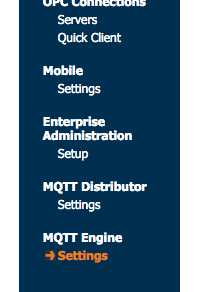You are viewing an old version of this page. View the current version.
Compare with Current
View Page History
« Previous
Version 10
Next »
MQTT Engine provides a configuration section to the Ignition Gateway. These can be seen in the Configure section of the Ignition Gateway web UI.

Once in the configuration section there are two tabs. The first is a list of MQTT Servers that MQTT Engine should connect to. By default, MQTT Engine is configured to connect to the MQTT Distributor based MQTT Server. It is set up to connect to localhost, port 1883, using the default username/password pair of admin/changeme. So, out of the box MQTT Engine will work with MQTT Distributor and its default configuration. In addition there is an advanced tab which allows one to configure Application ID Filters and Cirrus Link Chariot Access Settings. The Chariot access settings settings are used in conjunction with a Cirrus Link Chariot deployment and will be provided when purchasing Chariot Cloud services.
Additional or alternative MQTT Servers can be configured in MQTT Engine. Often times more than one will be configured to handle fail-over or in redundant or geographically distributed systems. The configuration options for servers are listed below.
- Name - This is the friendly name of the MQTT Server used to easily identify it
- URL - This is the URL of the MQTT server. Its format is as follows: [protocol]://[location]:[port]. Each of these are shown below
- protocol - Either tcp or ssl
- location - The server location. e.g. localhost, myserver.chariot.io, mydomain.com, etc
- port - The port the MQTT Server is listening on. Generally this is 1883 if using TCP or 8883 if using SSL
- Server Type - This is the type of MQTT Server to connect to
- Chariot - If connecting to a Cirrus Link Chariot on-premise or Chariot cloud based MQTT Server
- MQTT_Distributor - If connecting to a Ignition MQTT Distributor server
- Third_Party - If connecting to a third party 3.1.1 compliant MQTT Server
- Client ID - Optional MQTT client ID to use. If specified this will be used in the MQTT Engine connect packet when connecting to the server. If left blank, a random client ID will be create of the form 'IgnitionTarget-xxxxxxxx-xxxx-xxxx
- Username - The MQTT username to use in the MQTT connect packet. This is required if the MQTT Server to connect to requires it
- Password - The MQTT password to use in the MQTT connect packet. This is required if the MQTT Server to connect to requires it
- Certificates - The server certificates to use if required. These are generally only required when connecting using TLS and the MQTT server does not have a genuine certificate issued by a trusted certificate authority.
In addition to configuring the MQTT servers MQTT Engine will connect to, there are a set of advanced options. These are described below.
- Primary Host ID
- The primary host ID to use for 'state' checks. These checks are used to ensure that the primary backend MQTT Engine client remains connected. If the primary host ID is set, MQTT Engine will publish it's connection state on a topic that contains the Primary Host ID. In the event that MQTT Engine becomes disconnected from the server, a death certificate will be published on the same topic, setting the state to 'offline'. Any connecting client that subscribes on the state topic will then be notified of the MQTT Engine state and walk to the next server is MQTT Engine is offline.
- Group ID Filters
- A comma seperated list of group IDs to ignore. If no group IDs are to be ignored, this should be left empty
- Chariot Cloud Access Key
- If using Cirrus Link's Chariot platform, this is the provided Access Key
- Chariot Cloud Secret Key
- If using Cirrus Link's Chariot platform, this is the provided Secret Key
- Block Commands
- Whether or not to block outgoing commands from MQTT Engine. This is true by default and provides a security mechanism for preventing accidental outgoing commands from MQTT Engine
![]()
![]()
![]()
![]()
![]()
![]()
![]()